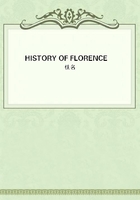
第72章
CHAPTER I
License and Slavery peculiar defects in republican governments--Application of this reflection to the state of Florence--Giovanni di Bicci di' Medici re-establishes the authority of his family--Filippo Visconti, duke of Milan, endeavors to make amicable arrangements with the Florentines--Their jealousy of him--Precautionary measures against him--War declared--The Florentines are routed by the ducal forces.
Republican governments, more especially those imperfectly organized, frequently change their rulers and the form of their institutions; not by the influence of liberty or subjection, as many suppose, but by that of slavery and license; for with the nobility or the people, the ministers respectively of slavery or licentiousness, only the name of liberty is in any estimation, neither of them choosing to be subject either to magistrates or laws. When, however, a good, wise, and powerful citizen appears (which is but seldom), who establishes ordinances capable of appeasing or restraining these contending dispositions, so as to prevent them from doing mischief, then the government may be called free, and its institutions firm and secure;for having good laws for its basis, and good regulations for carrying them into effect, it needs not, like others, the virtue of one man for its maintenance. With such excellent laws and institutions, many of those ancient republics, which were of long duration, were endowed.
But these advantages are, and always have been, denied to those which frequently change from tyranny to license, or the reverse; because, from the powerful enemies which each condition creates itself, they neither have, nor can possess any stability; for tyranny cannot please the good, and license is offensive to the wise: the former may easily be productive of mischief, while the latter can scarcely be beneficial; in the former, the insolent have too much authority, and in the latter, the foolish; so that each requires for their welfare the virtue and the good fortune of some individual who may be removed by death, or become unserviceable by misfortune.
Hence, it appears, that the government which commenced in Florence at the death of Giorgio Scali, in 1381, was first sustained by the talents of Maso degli Albizzi, and then by those of Niccolo da Uzzano.
The city remained tranquil from 1414 to 1422; for King Ladislaus was dead, and Lombardy divided into several parts; so that there was nothing either internal or external to occasion uneasiness. Next to Niccolo da Uzzano in authority, were Bartolomeo Valori, Neroni di Nigi, Rinaldo degli Albizzi, Neri di Gino, and Lapo Niccolini. The factions that arose from the quarrels of the Albizzi and the Ricci, and which were afterward so unhappily revived by Salvestro de' Medici, were never extinguished; for though the party most favored by the rabble only continued three years, and in 1381 was put down, still, as it comprehended the greatest numerical proportion, it was never entirely extinct, though the frequent Balias and persecutions of its leaders from 1381 to 1400, reduced it almost to nothing. The first families that suffered in this way were the Alberti, the Ricci, and the Medici, which were frequently deprived both of men and money; and if any of them remained in the city, they were deprived of the honors of government. These oft-repeated acts of oppression humiliated the faction, and almost annihilated it. Still, many retained the remembrance of the injuries they had received, and a desire of vengeance remained pent in their bosoms, ungratified and unquenched.
Those nobles of the people, or new nobility, who peaceably governed the city, committed two errors, which eventually caused the ruin of their party; the first was, that by long continuance in power they became insolent; the second, that the envy they entertained toward each other, and their uninterrupted possession of power, destroyed that vigilance over those who might injure them, which they ought to have exercised. Thus daily renewing the hatred of a mass of the people by their sinister proceedings, and either negligent of the threatened dangers, because rendered fearless by prosperity, or encouraging them through mutual envy, they gave an opportunity to the family of the Medici to recover their influence. The first to do so was Giovanni di Bicci de' Medici, who having become one of the richest men, and being of a humane and benevolent disposition, obtained the supreme magistracy by the consent of those in power. This circumstance gave so much gratification to the mass of the people (the multitude thinking they had now found a defender), that not without occasion the judicious of the party observed it with jealousy, for they perceived all the former feelings of the city revived. Niccolo da Uzzano did not fail to acquaint the other citizens with the matter, explaining to them how dangerous it was to aggrandize one who possessed so much influence; that it was easy to remedy an evil at its commencement, but exceedingly difficult after having allowed it to gather strength; and that Giovanni possessed several qualities far surpassing those of Salvestro. The associates of Niccolo were uninfluenced by his remarks;for they were jealous of his reputation, and desired to exalt some person, by means of whom he might be humbled.